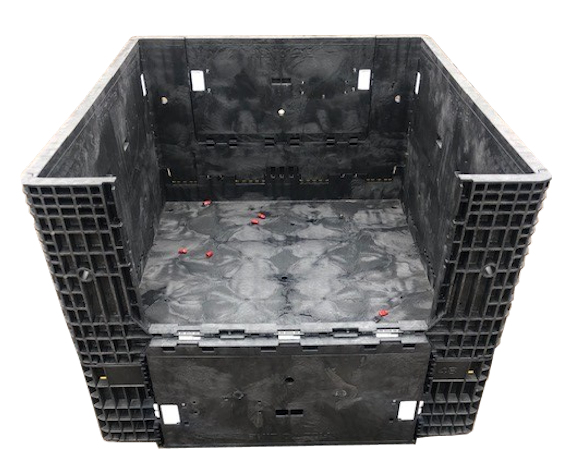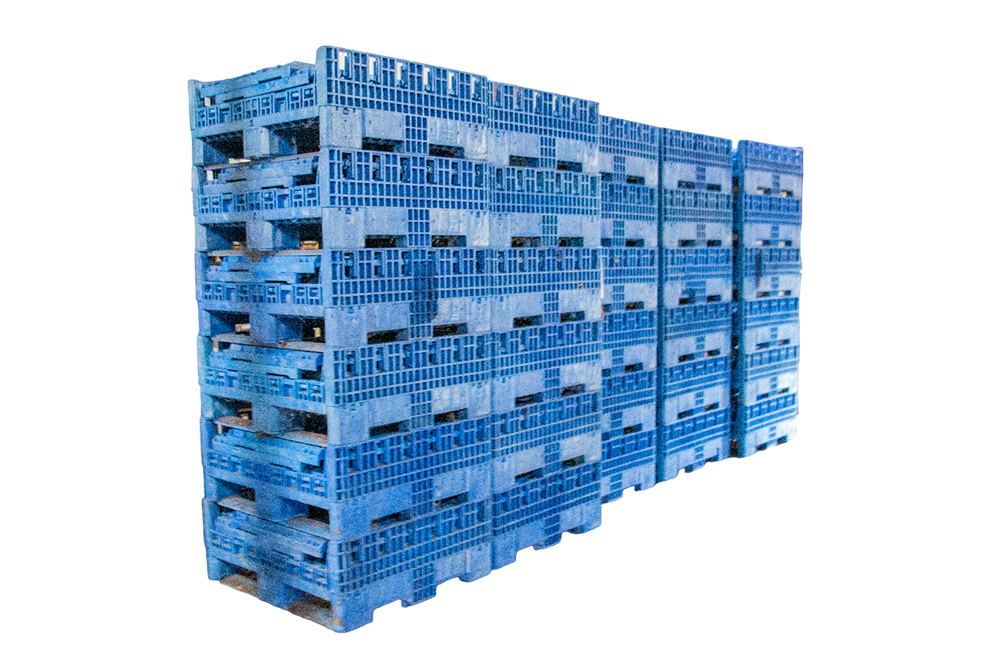Why refurbished bulk containers are smart solutions for sustainable businesses
Why Bulk Containers Are Crucial for Sustainable and Economical Transportation
Bulk containers play an important role in modern logistics. They help with the effective motion of huge quantities of items, therefore maximizing transport procedures. This approach not just minimizes expenses but also minimizes ecological impact with reduced emissions and waste generation. As markets look for even more lasting methods, the fostering of mass containers is becoming increasingly significant. What ramifications does this shift hold for future logistics and supply chain management?

The Advantages of Using Mass Containers in Logistics
Mass containers reinvent logistics by enhancing efficiency and sustainability. These containers enable the transport of large quantities of items in a single journey, significantly decreasing the number of trips called for. This not only streamlines operations yet additionally lessens labor prices associated with handling, filling, and dumping. Furthermore, mass containers are made to maximize area use within transportation cars, making certain that even more items can be delivered concurrently.
The standardization of mass containers also streamlines the logistics process. With consistent measurements, they can be quickly stacked and saved, resulting in improved warehouse monitoring. Bulk containers usually feature durable products that secure materials from damage throughout transit, thereby decreasing item loss and boosting general reliability. Because of this, organizations can experience improved supply chain performance, eventually causing enhanced success and customer satisfaction. This mix of variables makes bulk containers a vital property in contemporary logistics.
Ecological Effect: Lowering Waste and Carbon Footprint
As markets significantly prioritize sustainability, the adoption of mass containers has actually emerged as a crucial technique for decreasing waste and decreasing carbon footprints. These containers reduce making use of product packaging materials, such as boxes and plastic, thus significantly reducing total waste generation. By combining shipments, bulk containers boost transportation performance, enabling more items to be transported per trip. This reduction in journeys straight associates with reduced greenhouse gas emissions, adding to a smaller sized carbon impact.
Mass containers can often be recycled or recycled, better alleviating ecological effect. The sturdiness of these containers guarantees they can hold up against multiple transport cycles, decreasing the demand for single-use alternatives. used plastic containers. By streamlining logistics and promoting effective source use, mass containers not just sustain lasting practices but also encourage sectors to align with global ecological goals. Inevitably, their execution reflects a commitment to eco-friendly stewardship and liable resource monitoring
Cost Savings: Just How Bulk Containers Lower Transport Expenditures
While numerous business look for ways to boost their profits, the usage of bulk containers offers a considerable possibility for reducing transportation expenditures. Mass containers maximize the volume of goods transported, allowing services to deliver larger quantities simultaneously. This performance decreases the variety of trips called for, directly decreasing fuel prices and reducing labor expenditures linked with loading and discharging.
In addition, bulk containers frequently feature structured styles that maximize room use within transport automobiles. This means fewer voids, resulting in much more efficient use offered ability. Moreover, the durability of bulk containers can decrease the threat of product damage during transportation, ensuring and minimizing losses that even more products get here undamaged.
Enhancing Supply Chain Effectiveness With Mass Storage Solutions
Mass storage services play a necessary role in improving supply chain efficiency by maximizing stock administration. By settling items into fewer, bigger containers, organizations can substantially minimize taking care of prices connected with frequent transfers and processing. This streamlined technique allows for better monitoring and administration of supply, ultimately causing enhanced operational performance.
Streamlined Supply Administration
Efficient stock administration is necessary for optimizing supply chain procedures, particularly when companies adopt bulk storage options. These options allow companies to preserve greater stock degrees while decreasing the frequency of replenishment. By combining materials right into mass containers, firms can enhance their inventory processes, lowering the intricacy connected with tracking multiple smaller plans. This strategy assists in precise supply counts and improves projecting precision, permitting for even more informed decision-making. In enhancement, mass storage space options streamline storehouse company, making it easier to find and gain access to items when required. Therefore, organizations can attain a more reliable inventory turn over price, ultimately enhancing overall supply chain performance and decreasing the likelihood of stockouts or overstock scenarios.

Decreased Handling Costs
The implementation of mass storage solutions not only streamlines inventory management yet additionally significantly lowers taking care of prices across the supply chain. By consolidating materials right into bulk containers, business decrease the need for frequent handling and transfer between various storage space and transport systems. This method reduces down on labor prices related to loading, discharging, and relocating smaller sized plans. Additionally, bulk storage minimizes the regularity of deliveries, leading to lower transport expenses and reduced fuel usage. Because of this, services can maximize their logistics procedures, permitting for an extra reliable appropriation of resources. Inevitably, minimized handling costs contribute to boosted overall supply chain performance, fostering an environment that supports both sustainability and financial viability.
Flexibility of Mass Containers Throughout Different Industries
Although several sectors have distinct demands for transport and storage space, mass containers have actually arised as a versatile service that satisfies a vast range of requirements. These containers, varying from huge bins to specialized tanks, can accommodate diverse products, including granules, powders, and fluids. In the agricultural sector, mass containers help with the transport of grains and plant foods, while the food and drink market uses them for components and completed products. The chemical industry relies upon mass containers for securely transferring dangerous products, making certain compliance with safety and security regulations. Furthermore, building and construction companies take advantage of bulk containers for carrying aggregates and other products. Their versatility prolongs to various modes of transportation, consisting of trains, vehicles, and ships, improving logistical effectiveness. This flexibility not only enhances operations across different sectors yet likewise promotes sustainability by lowering product packaging waste and maximizing area en route. For that reason, bulk containers play a necessary function in modern supply chain management.
Future Patterns in Bulk Container Usage and Sustainability
The future of bulk container use is increasingly formed by cutting-edge materials growth that improves sustainability. In addition, automation in logistics guarantees to simplify procedures, lowering waste and enhancing performance. Accepting round economic situation practices will certainly even more change how bulk containers are made, used, and recycled, cultivating a much more sustainable transport landscape.
Cutting-edge Materials Development
As markets progressively focus on sustainability, cutting-edge materials growth wholesale containers emerges as a substantial factor in enhancing eco-friendly transportation solutions. Manufacturers and scientists are checking out naturally degradable plastics, recycled compounds, and light-weight metals to reduce environmental effect. These products not just decrease waste yet likewise enhance fuel performance by decreasing the overall weight of containers. In addition, developments in wise products, which can adjust to differing conditions, enhance the longevity and functionality of mass containers. The assimilation of these innovative materials straightens with round economic situation concepts, advertising reuse and recycling. As the need for sustainable techniques expands, the development of such products will certainly play an essential duty in forming the future of mass container usage in logistics and transportation.
Automation in Logistics
Significant developments in automation are poised to transform logistics and the use of mass containers, boosting sustainability in transport. Automated systems, consisting of drones and independent lorries, are simplifying the activity of mass containers, lowering the dependence on typical fuel-powered transportation. These modern technologies maximize transmitting and filling procedures, decreasing vacant miles and boosting fuel efficiency. Additionally, automated supply administration systems enhance monitoring and monitoring of mass containers, ensuring far better resource appropriation and minimized waste. The integration of the Net of Points (IoT) permits real-time information evaluation, enabling proactive decision-making that aligns with sustainability objectives. As automation remains to develop, it is expected to drive better technologies wholesale container usage, inevitably sustaining more lasting logistics methods and decreasing the ecological effect of transport.
Circular Economic Situation Practices
Developments in automation are establishing the stage for a much more incorporated technique to round economy techniques in the domain of mass container usage. As industries significantly embrace sustainability, bulk containers are being made for longevity and reusability. This change not just lessens waste but likewise boosts resource performance. Companies are embracing approaches such as closed-loop systems, where used containers are gathered, reconditioned, and reintroduced into the supply chain. In addition, wise technologies track container life cycles, helping with far better administration and decreasing ecological influence. The collaboration between manufacturers, logistics carriers, and end-users is important in establishing requirements for lasting container usage. used collapsible bulk containers. Future patterns show a growing emphasis on materials that are recyclable and biodegradable, more enhancing the circular economic climate's concepts wholesale transport

Frequently Asked Inquiries
What Products Are Bulk Containers Generally Made From?
Mass containers are usually built from long lasting materials such as high-density polyethylene, cardboard, aluminum, and steel. These products provide security, flexibility, and stamina, making them appropriate for transferring numerous goods in different industries efficiently.
How Do I Select the Right Size Bulk Container?
Choosing the best dimension bulk container entails examining the quantity of materials to be carried, taking into consideration dealing with equipment compatibility, and appraising storage space requirements. Correct dimension warranties effectiveness in transportation and reduces waste during delivery.
Are Mass Containers Reusable or Recyclable?
Bulk containers are frequently reusable, made for numerous journeys, enhancing sustainability. Many can additionally be reused, depending upon the materials made use of. Selecting recyclable options further sustains ecological objectives and lowers waste in transport techniques.
What Safety And Security Rules Relate To Mass Container Transportation?
Safety and security laws for mass container transport consist of conformity with the Department of Transportation guidelines, proper labeling of dangerous materials, structural integrity assessments, and adherence to weight limits to guarantee safe handling and prevent crashes throughout transportation.
Exactly How Can Companies Shift to Using Bulk Containers Properly?
Companies can change to bulk containers by evaluating present logistics, training staff on handling, purchasing suitable equipment, optimizing stock administration, and working together with providers to assure compatibility and efficiency throughout the supply chain.
As sectors progressively prioritize sustainability, the adoption of bulk containers has actually emerged as an essential method for minimizing waste and decreasing carbon footprints. By consolidating products into bulk used collapsible bulk containers containers, business can improve their stock procedures, reducing the complexity connected with tracking several smaller plans. As sectors progressively focus on sustainability, cutting-edge materials development in bulk containers emerges as a substantial element in improving environmentally friendly transport solutions. Automated systems, consisting of drones and independent vehicles, are streamlining the motion of bulk containers, lowering the reliance on conventional fuel-powered transport. Furthermore, automated inventory management systems enhance monitoring and monitoring of mass containers, making certain much better resource allocation and decreased waste.